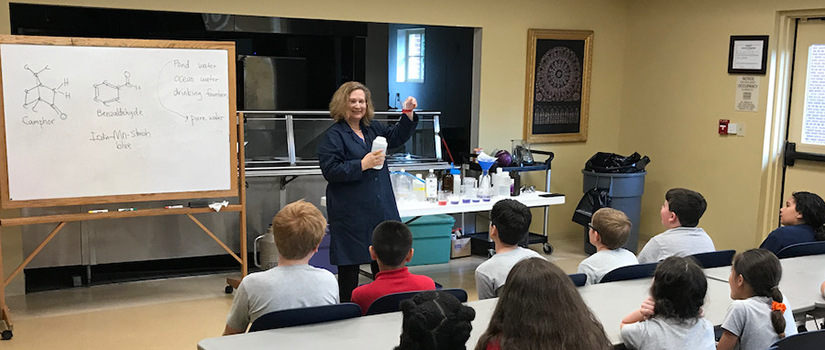One day this spring, Linda Shimizu took a short break from her National Science Foundation-funded research to make slime on a Zoom call with elementary students.
That’s one of several reasons why the University of South Carolina chemistry professor earned the state’s top award for science education for 2021. Shimizu has spread her love for science statewide in K-12 schools, reaching more than 24,000 students over the past 21 years.
In addition to the occasional slime-making session, she has shown kids how to vaporize dry ice and how to refreeze it with liquid nitrogen.
Or how to make nylon, pulling a string out of two colorless liquids as if by magic.
Or how to use red cabbage juice to measure acidity with colorful chemical reactions.
Regardless of the age group she presents to, the excitement is the same, she says.
“Not everyone is going to be a scientist, and that’s not the goal. But everyone can understand what we’re doing, and it’s more accessible to people,” Shimizu says.
It’s a nice way to give back, and it’s really wonderful to see that spark in people’s eyes.
― Linda Shimizu
Becoming a state-honored scientist was not a foregone outcome for Shimizu. In fact, when she was in high school, she planned to study political science in college and become a diplomat. But she took one chemistry class that changed her course. The process of testing ideas in a lab, followed by the thrill of discovery or the challenge to try again, had her hooked.
You might say she became a diplomat for science, instead of for her country. While in college, she participated in a program where she and her classmates performed science demonstrations. When she began teaching at UofSC, she received funding from SC EPSCor, a program that encourages research, to start a similar chemistry outreach program for South Carolina.
More than 200 UofSC students have joined Shimizu for her outings to K-12 schools, public and private, in South Carolina. It helps the college students as much as anyone, Shimizu says.
“It’s good for my students, because they can get more experience communicating their science,” Shimizu says. “You get that energy back that the high school and middle school and even some of the elementary school students have.”
In addition to that, Shimizu loves to mentor her college students, many of whom find their first real research project in her lab. With the support of the National Science Foundation, she and her students are exploring chemical reactions in a straw-shaped molecule. Additionally, the National Institutes of Health has funded another project for Shimizu’s lab exploring medications for treating triple-negative breast cancer.
“Being able to ask a question, design an experiment to test it, and then go into the lab to see if it worked or not, that's what I seek to provide for my students,” Shimizu says.
Receiving the Governor’s Award for Excellence in Scientific Awareness was validating recognition, Shimizu says, but the real reward is the experience of sharing her passion for science.
“It’s a nice way to give back, and it’s really wonderful to see that spark in people’s eyes,” Shimizu says. “Chemistry doesn’t have the best reputation in high school. I love to see it go from a dry, book thing, to something that's really exciting.”
This story was part of the College of Arts and Sciences Fall 2021 alumni magazine. To read more stories from this magazine, visit go.sc.edu/CASMagazine.
